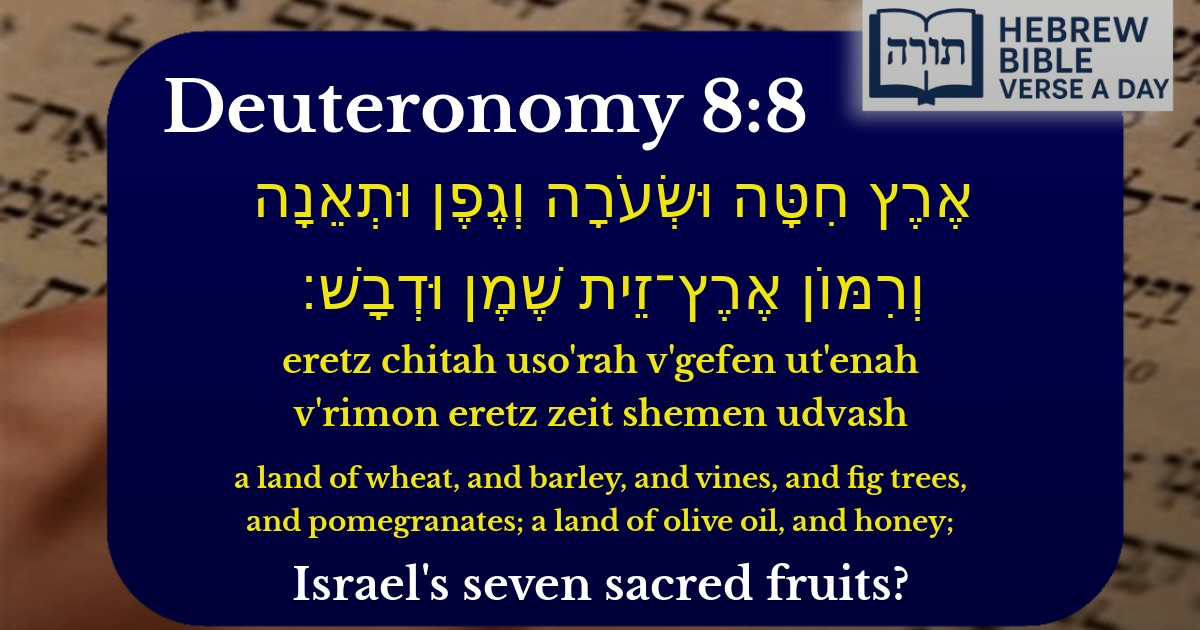Frequently Asked Questions
Q: What does Deuteronomy 8:8 mean when it describes the Land of Israel?
A: Deuteronomy 8:8 highlights the abundance and blessings of the Land of Israel by listing its seven special species: wheat, barley, grapes (vines), figs, pomegranates, olives (oil), and dates (honey). These species are uniquely praised in the Torah and are central to Jewish agricultural laws and blessings (Mishnah Bikkurim 1:3).
Q: Why are these seven species specifically mentioned in the Torah?
A: The seven species are singled out because the Land of Israel is especially blessed with them (Rashi on Deuteronomy 8:8). They hold spiritual significance and are used for mitzvot (commandments), such as bringing first fruits (Bikkurim) to the Temple (Deuteronomy 26:1-11). The Talmud (Berachot 41a) also teaches that these species have special status for blessings.
Q: What is the significance of olive oil and honey in this verse?
A: Olive oil symbolizes wisdom and light (as used in the Menorah), while honey (from dates, not bees) represents sweetness and Torah learning (Midrash Tanchuma, Eikev 1). Both are essential in Jewish tradition—oil for lighting and anointing, and date honey as a staple food and symbol of prosperity.
Q: How do these seven species apply to Jewish practice today?
A: These species are still central in Jewish life: 1) Wheat and barley are used for matzah and the Omer offering. 2) Wine (from vines) is used for Kiddush. 3) Figs, pomegranates, olives, and dates are eaten on holidays and Tu B'Shvat. Special blessings (Me’ein Shalosh) are recited after eating them (Shulchan Aruch, Orach Chaim 208).
Q: What lesson can we learn from this verse about gratitude?
A: This verse reminds us to recognize and thank Hashem for the Land’s bounty. The Rambam (Hilchot Berachot 1:1) teaches that saying blessings over food—especially these species—cultivates gratitude. Deuteronomy 8:10 commands us to bless Hashem after eating, reinforcing this value.


The Seven Species of Eretz Yisrael
The verse (Devarim 8:8) enumerates the seven species for which Eretz Yisrael is praised. These are: wheat, barley, grapes (vines), figs, pomegranates, olive oil, and date honey (as explained by Rashi and the Talmud in Bava Batra 80b). These species hold special significance in Halacha and Jewish thought.
Symbolism of the Seven Species
According to the Midrash (Sifrei Devarim), each of these species represents different aspects of Torah and spiritual growth:
Halachic Significance
These species have special halachic status (Mishna Bikkurim 1:3):
Agricultural Blessing
The Kli Yakar notes the progression from basic grains (wheat, barley) to fruits, showing Eretz Yisrael's superior quality where even basic necessities grow with special abundance. The mention of oil and honey (processed products) demonstrates the land's capacity to produce not just raw materials but refined products as well.